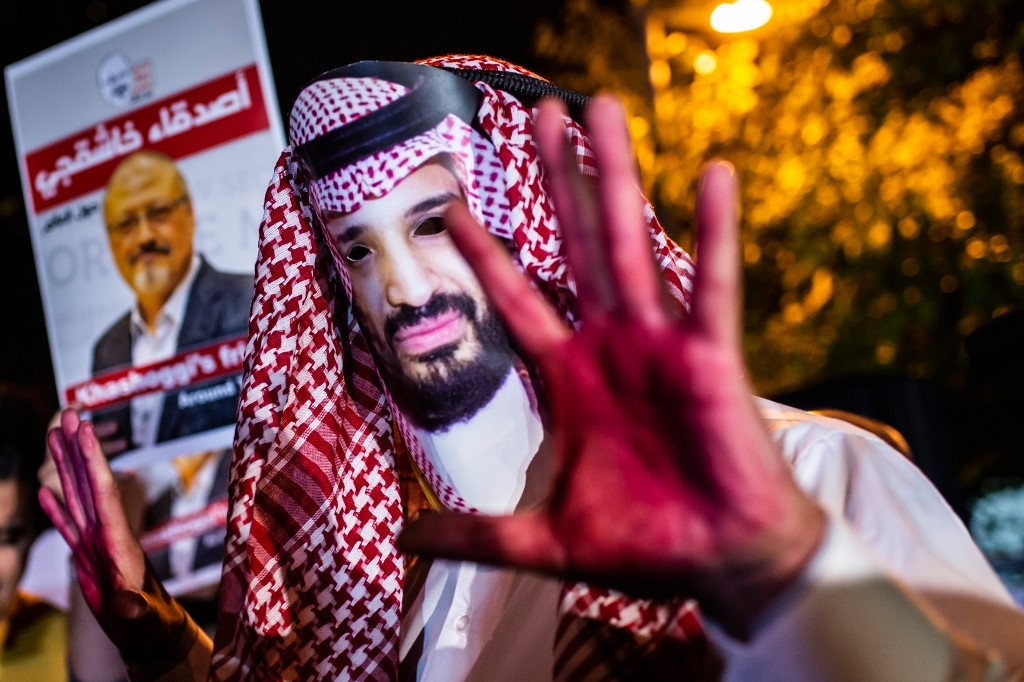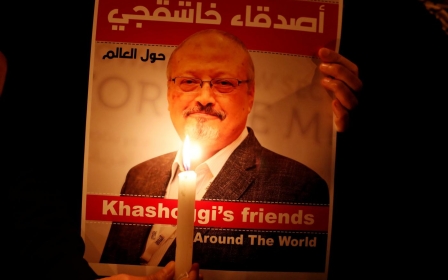Khashoggi murder: Advocates decry US failure to impose sanctions on MBS

The virtual ink on a US intelligence report blaming Mohammed bin Salman for the murder of Jamal Khashoggi had not dried when the Biden administration ruled out imposing sanctions on the crown prince - a move that rights groups say would be fundamental for ensuring justice for the slain journalist.
US Secretary of State Antony Blinken confirmed on Friday that Washington will not take action against the crown prince himself.
The US State and Treasury departments had announced sanctions against dozens of Saudi individuals over their involvement in the Khashoggi murder and other rights violations without identifying them.
"What we've done by the actions that we've taken is really not to rupture the relationship but to recalibrate it to be more in line with our interests and our values," Blinken told reporters.
Earlier on Friday, the State Department unveiled new visa restrictions dubbed the "Khashoggi Ban" that would allow Washington to target "individuals who, acting on behalf of a foreign government, are believed to have been directly engaged in serious, extraterritorial counter-dissident activities".
New MEE newsletter: Jerusalem Dispatch
Sign up to get the latest insights and analysis on Israel-Palestine, alongside Turkey Unpacked and other MEE newsletters
For its part, the Treasury said it had imposed sanctions on several Saudi officials, including Ahmed al-Asiri, former deputy head of military intelligence at the time of Khashoggi's assassination, and members of the hit team that carried out the murder, known as the "Tiger Squad" or Rapid Intervention Force.
However, without sanctions against MBS, whom the US government now publicly acknowledges was responsible for the killing, some advocates and lawmakers are saying the mastermind of the assassination is getting away with murder.
'Unconscionable'
Andrea Prasow, deputy Washington director at Human Rights Watch, called failure to impose sanctions on MBS over the killing "unconscionable".
"The fact that the US has sanctioned so many of MBS's associates but not him sends a terrible message that the higher up in a government you are, the more likely it is you can commit crimes with impunity," Prasow told MEE.
"It also undermines US credibility. It's hard to see what incentive MBS has to alter his conduct, whether inside Saudi Arabia, in his conduct in the war in Yemen, or in other extraterritorial attacks on dissidents, when he knows he can literally get away with murder."
Khashoggi, a former Saudi government insider and journalist who wrote for the Washington Post and Middle East Eye, resided in the United States before his death.
Saudi government agents murdered him and dismembered his body at the kingdom's consulate in Istanbul, while he was trying to retrieve personal paperwork, in October 2018.
After initially insisting that Khashoggi left the building alive, Saudi officials acknowledged more than two weeks after the murder that the journalist had been killed. Riyadh insists that the assassination was a rogue operation that happened without the approval of top officials.
The murder sent shockwaves throughout Washington, amplifying criticism against the kingdom in Congress, but then-president Donald Trump moved to shield Riyadh and particularly the crown prince from the fallout.
The Trump administration refused a legally binding congressional request to release a report on the US intelligence community's findings about the involvement of Saudi officials in the murder.
The administration of President Joe Biden, who as a presidential candidate in 2019 had called Saudi Arabia a "pariah," made the report public on Friday, documenting what experts had been saying for years - that the murder, which involved the crown prince's aides, could not have happened without his blessing.
"Aides were unlikely to question Mohammad bin Salman's orders or undertake sensitive actions without his consent," the report said.
Saudi Arabia was quick to reject the findings, calling the US assessment "negative, false and unacceptable".
'Free pass'
While rights groups hailed the release of the report as a step towards ensuring accountability for the murder, the administration's failure to impose sanctions on the lead perpetrator left many disappointed.
"The Biden administration is trying to thread the needle. They want to continue to work with a partner that has committed a heinous act against a US resident, while taking some steps toward accountability," Seth Binder, advocacy officer at the Project on Middle East Democracy (POMED), told MEE.
"But if human rights is really going to be at the centre of US foreign policy, as the administration has repeatedly stated, then it can't give murderers a free pass."
Before taking office, Biden vowed to "reassess" US-Saudi relations. Since his inauguration, he has paused some arms sales to Riyadh and announced an end to Washington's support for the kingdom's "offensive operations" in Yemen.
Still, many rights advocates and lawmakers are demanding a more forceful approach to Riyadh and MBS from Washington.
'We're calling on the Biden administration to move ahead with accountability measures to sanction MBS personally'
- Raed Jarrar, DAWN
"We're calling on the Biden administration to move ahead with accountability measures to sanction MBS personally, along with everyone else who is implicated in that killing," said Raed Jarrar, advocacy director at Democracy for the Arab World Now (DAWN).
Established last year in Washington, DAWN, a rights group, was envisioned by Khashoggi before his murder.
Speaking at a news conference after the release of the report, Jarrar urged ending US weapons sales to the kingdom. "Transparency is meaningless without accountability," he said.
Philippe Nassif, advocacy director for the Middle East and North Africa at Amnesty International USA, said many rights advocates are "disappointed" in Washington's decision against sanctioning MBS.
He added that Congress and the Biden administration should halt offensive arms sales to Saudi Arabia, not only over the murder of Khashoggi but also for the mistreatment of dissidents at home and war crimes in Yemen.
"That warrants at the very least congressional action and a decision by the Biden administration to hit Saudi Arabia hard by banning these offensive sales because this is something that will send a very clear message to the international community that they also should do the same thing," Nassif told MEE.
"And this goes for France. And this goes for Britain, and goes for a whole host of European countries that also sell weapons to Saudi Arabia."
Congress members call for sanctions
Leading Congress members from Biden's own Democratic Party said on Friday that the president should impose sanctions on MBS.
Congresswoman Ilhan Omar announced on Friday that she will be introducing a bill to penalise the crown prince. She called the release of the report a "turning point" in US-Saudi relations.
"To this day, we continue to supply Saudi Arabia with US arms that are used to commit human rights abuses around the world," the congresswoman said in a statement.
"To this day, we still cooperate with the Saudi regime on defensive war efforts - including intelligence sharing. These must end. And there must be direct consequences for Mohamed bin Salman and his functionaries."
Congressman Adam Schiff, chair of the House Intelligence Committee who has been pushing for making the report public, hailed releasing the assessment but said the administration should do more to hold MBS accountable.
He decried going after those who carried out the assassination, but not the leader who ordered it.
"The report itself is pretty remarkable in saying in no uncertain terms that the crown prince of Saudi Arabia ordered the capture or killing of an American resident and journalist, that essentially the crown prince has blood on his hands," Schiff told CNN.
"I would like to see the administration go beyond what it is announced in terms of repercussions to make sure there are repercussions directly to the crown prince."
Ron Wyden, a key Senate Democrat, also underscored the need to ensure that MBS is punished for the murder.
"By naming Mohammed bin Salman as the amoral murderer responsible for this heinous crime, the Biden-Harris administration is beginning to finally reassess America's relationship with Saudi Arabia and make clear that oil won't wash away blood," he said in a statement.
"There is still far more to do to ensure that the Saudi government follows international laws. There should be personal consequences for MBS – he should suffer sanctions, including financial, travel and legal - and the Saudi government should suffer grave consequences as long as he remains in the government."
Middle East Eye delivers independent and unrivalled coverage and analysis of the Middle East, North Africa and beyond. To learn more about republishing this content and the associated fees, please fill out this form. More about MEE can be found here.






